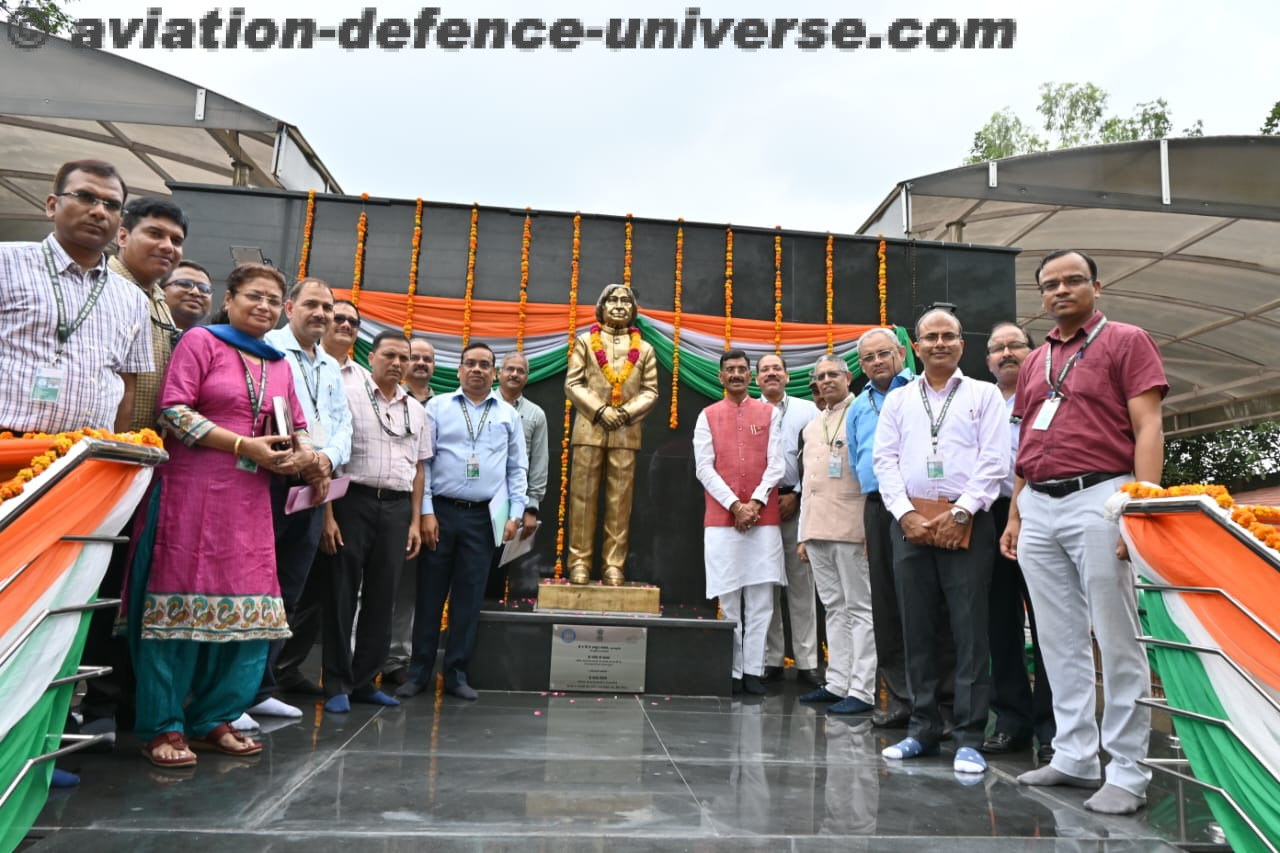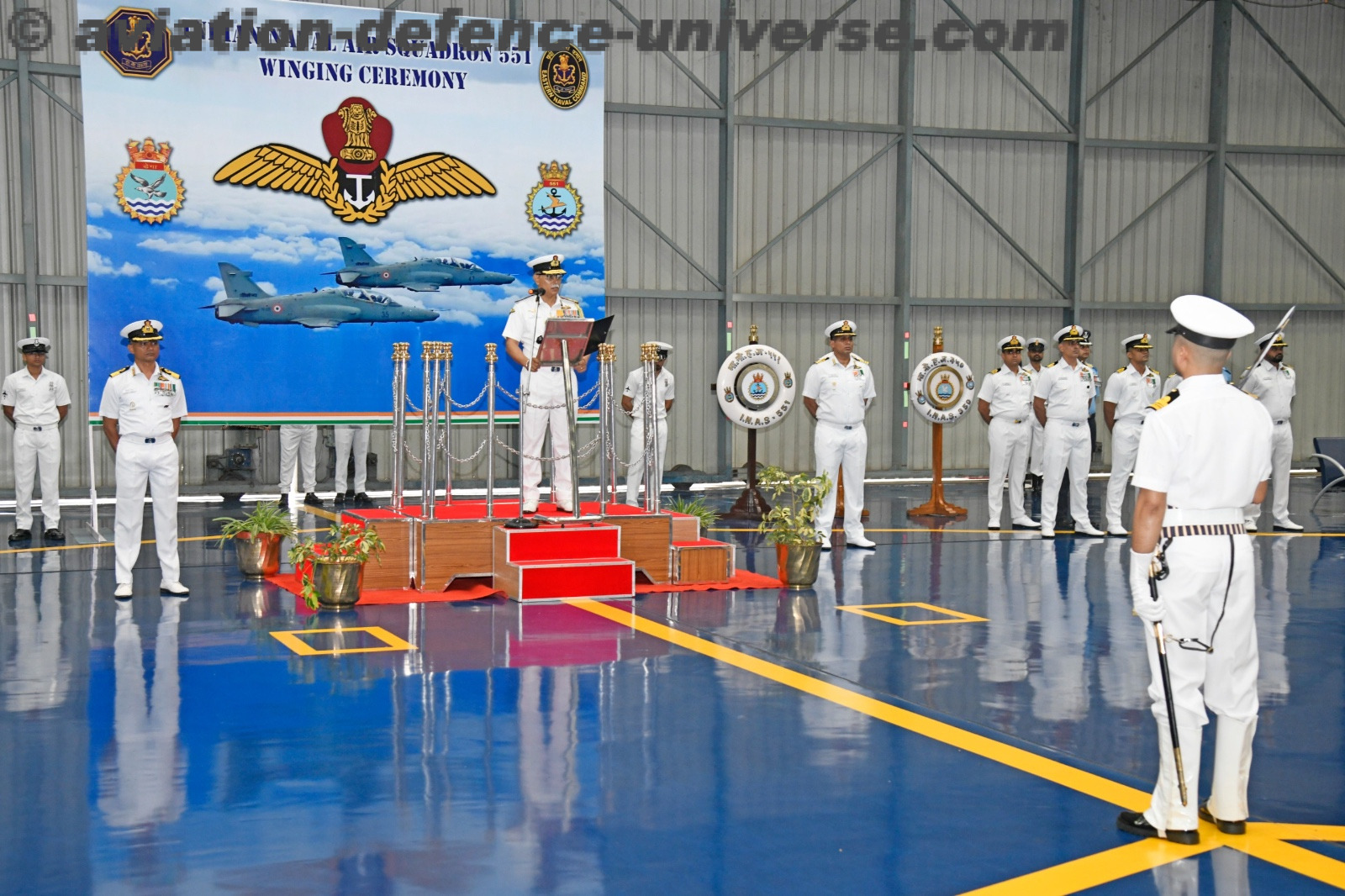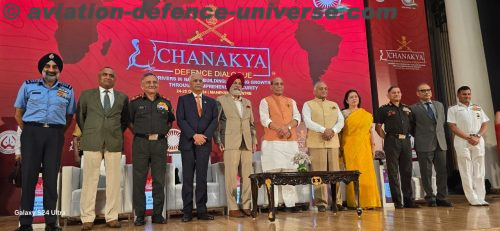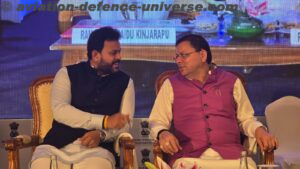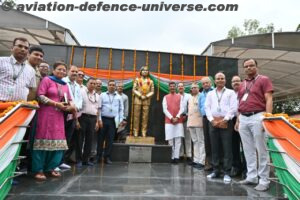- Focus on Security and Nation Building
- Indian Army Showcases Green Initiatives and Digital Transformation at Chanakya Defence Dialogue 2024
- Govt bridging gap between development & security
By Sangeeta Saxena
New Delhi. 24 October 2024. Defence Minister Rajnath Singh emphasized the importance of analysing the Defence sector’s impact on key economic indicators such as income generation, job creation, regional economic balance, manufacturing growth, investment, research and development, and the expansion of the service sector. He stated, “Understanding these dynamics will offer valuable insights for policy formulation, allowing us to harness the Defence sector as a driver of broader economic progress.”
He was addressing a jam packed house at the Chanakya Defence Dialogue 2024 co-hosted by the Indian Army and the Centre for Land Warfare Studies (CLAWS), which was a crowd puller on the Day1. This second edition focused on the theme ‘Drivers in Nation Building: Fuelling Growth Through Comprehensive Security’, emphasising the critical role of security in shaping national and international policy frameworks.
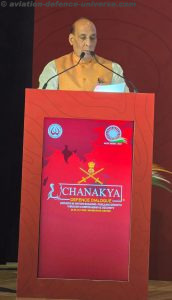 Having the Defence Minister, Chief of Defence Staff, Army Chief, Air Force Chief and DG CLAWS on the stage , and no discussion on India- China LAC pact would have been unbelievable. So just as if on cue the Minister strongly stated, “the broad consensus achieved by India and China to resolve their differences in certain areas along LAC is proof that continuous dialogue brings solutions.” He said that the two nations had engaged in diplomatic and military discussions and that a general agreement had been reached to restore the ground situation on the basis of mutual security and equality. He claimed that this is the advantage of having an ongoing conversation.
Having the Defence Minister, Chief of Defence Staff, Army Chief, Air Force Chief and DG CLAWS on the stage , and no discussion on India- China LAC pact would have been unbelievable. So just as if on cue the Minister strongly stated, “the broad consensus achieved by India and China to resolve their differences in certain areas along LAC is proof that continuous dialogue brings solutions.” He said that the two nations had engaged in diplomatic and military discussions and that a general agreement had been reached to restore the ground situation on the basis of mutual security and equality. He claimed that this is the advantage of having an ongoing conversation.
The dialogue held critical discussions on the integration of security within national and international policy frameworks. Speakers from India, the United States, Russia, Israel, and Sri Lanka gave a global perspective on the role of security in shaping a nation’s development trajectory, with a focus on India’s vision of Viksit Bharat @2047. Four former Indian Army Chief General JJ Singh, General VK Singh, General MM Naravane and General Manoj Pande were also present at the event.
Indian Chief of the Army Staff General Upendra Dwivedi highlighted the strong link between national security and nation-building. Referring to Chanakya’s Saptang Theory, he emphasized the need for the development of effective state institutions, a robust governance mechanism, inclusive growth, the fostering of national identity, and the progressive transformation of society. He underscored that the Army not only ensures a secure and safe environment but also plays a vital role in every aspect of development, including economic growth, social cohesion, skill development, and environmental sustainability. He also also stressed the significance of the convergence of technology and security in today’s world. He advocated for the concept of Smart Power—an approach combining diplomacy, development, and military strength—which is critical for sustainable growth, as demonstrated in current global conflicts.
Defence Minister shared his thoughts on the subject of “India’s Vision for Development & Security,” saying that although “development” and “security” are sometimes seen from different angles, they are actually closely related and reinforce one another. Economic analysis has traditionally focused on the examination of important elements for economic growth, such as labor, capital, land, and entrepreneurship. Historically, the effects of security and Defence have received little attention. The reason for this could be that security is frequently seen as a vital but non-economic factor. Even during times of peace or non-conflict, national security, military spending, and infrastructure can have a big impact on resource allocation and economic growth, he said.
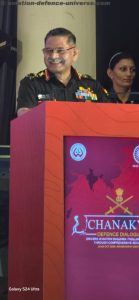 General Dwivedi added that “Defence diplomacy” is also very important. Growing obligations, opportunities, and expectations accompany the mission it carries, which is to advance a nation’s interests across broadening strategic horizons. Building relationships and trust bridges are two ways that this line of work can help a nation achieve its desired position in the international community.
General Dwivedi added that “Defence diplomacy” is also very important. Growing obligations, opportunities, and expectations accompany the mission it carries, which is to advance a nation’s interests across broadening strategic horizons. Building relationships and trust bridges are two ways that this line of work can help a nation achieve its desired position in the international community.
Rajnath Singh emphasized that security accounts for a sizeable amount of any country’s budget and that the industry itself plays a critical role in the economy by creating jobs, developing infrastructure, and advancing technology. He reaffirmed the government of Prime Minister Narendra Modi’s determination to close the gap between “development” and “security,” emphasizing that national security must be maintained before economic development can thrive. Defence Minister listed the measures the government is taking and stated that the goal of border area development is to ensure the socioeconomic advancement of the areas and strengthen the security apparatus. According to him, this in turn promotes economic growth.
The Chief explained that although physical security may be prioritized from a hard power standpoint, other factors are equally important. The recent pandemic, which posed a threat to health security, had an impact on the global economy. It is certain that many island nations will be affected in the upcoming years by the environmental sustainability challenge of increasing sea levels. An excellent example of science and technological security comes from Israel, a country that has owned numerous key technologies from its founding and has chosen to see its many problems as opportunities for progress. Numerous instances of the importance of energy security also stand out; Germany, for instance, has undergone a significant transformation. Its economic growth was greatly aided by renewable energy, but the conflict between Russia and Ukraine made its partial reliance on fossil fuels a hindrance.
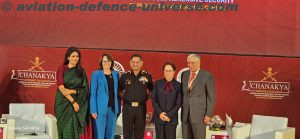 In addition to the inaugural session there were three panel discussions on the Day1 of the dialogue which discussed various topics and themes focussing on defence and national development. The first session of the Chanakya Defence Dialogue 2024, titled “Geopolitical Dynamics: Navigating the International Coliseum,” brought together leading policymakers, scholars, and experts to examine the interplay between strategic partnerships and national security in today’s rapidly evolving global landscape. The session was chaired by Palki Sharma. The panellists included Lisa A Curtis from Centre for New American Studies, US; Carice Witte from SIGNAL Group, Israel and Ambassador Kanwal Sibal, Former Foreign Secretary.
In addition to the inaugural session there were three panel discussions on the Day1 of the dialogue which discussed various topics and themes focussing on defence and national development. The first session of the Chanakya Defence Dialogue 2024, titled “Geopolitical Dynamics: Navigating the International Coliseum,” brought together leading policymakers, scholars, and experts to examine the interplay between strategic partnerships and national security in today’s rapidly evolving global landscape. The session was chaired by Palki Sharma. The panellists included Lisa A Curtis from Centre for New American Studies, US; Carice Witte from SIGNAL Group, Israel and Ambassador Kanwal Sibal, Former Foreign Secretary.
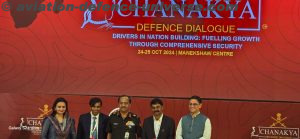 The second session on “Connecting Borders: Building Foundations for Economic Strength & Security,” convened a panel of experts to explore the critical intersection of economic development strategies and national security imperatives in today’s dynamic global environment. The session was chaired by Ms Gaurie Dwivedi. The panellists included Mr Asanga Abeyagoonasekera, Technical Advisor from IMF, Sri Lanka; Dr GS Reddy, Former Scientific Advisor to Defence Minister and Dr Sanjeev Sanyal, Member of PM’s Economic Advisory Council.
The second session on “Connecting Borders: Building Foundations for Economic Strength & Security,” convened a panel of experts to explore the critical intersection of economic development strategies and national security imperatives in today’s dynamic global environment. The session was chaired by Ms Gaurie Dwivedi. The panellists included Mr Asanga Abeyagoonasekera, Technical Advisor from IMF, Sri Lanka; Dr GS Reddy, Former Scientific Advisor to Defence Minister and Dr Sanjeev Sanyal, Member of PM’s Economic Advisory Council.
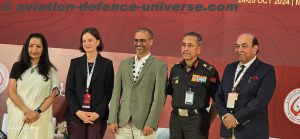 The third session was titled “Environmental Sustainability: Balancing Growth with Ecological Concerns,” focused on how nations can pursue economic development while safeguarding natural ecosystems, ensuring long-term resilience, and promoting global environmental stewardship, especially in the context of India. The session was chaired by Tara Kartha, from the Centre for Land Warfare Studies (CLAWS), and featured a distinguished panel of speakers including Elizabeth Threlkeld from the Stimson Centre, US; Rushikesh Chavan from the Habitats Trust, Noida; Lieutenant General SA Hasnain (Retired), representing the National Disaster Management Authority (NDMA).
The third session was titled “Environmental Sustainability: Balancing Growth with Ecological Concerns,” focused on how nations can pursue economic development while safeguarding natural ecosystems, ensuring long-term resilience, and promoting global environmental stewardship, especially in the context of India. The session was chaired by Tara Kartha, from the Centre for Land Warfare Studies (CLAWS), and featured a distinguished panel of speakers including Elizabeth Threlkeld from the Stimson Centre, US; Rushikesh Chavan from the Habitats Trust, Noida; Lieutenant General SA Hasnain (Retired), representing the National Disaster Management Authority (NDMA).
The Day1 of the dialogue not only assessed current security and development landscapes but also sought to design forward-thinking strategies for sustainable and inclusive growth. The Indian Army’s significant contributions to decarbonization and sustainable development were highlighted during the event. The Army has embraced green practices aimed at environmental preservation, ensuring that sustainability goes hand in hand with maintaining operational readiness.
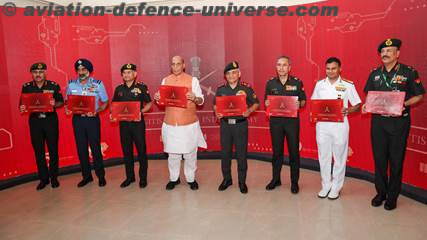 In addition to its green initiatives, the Indian Army showcased around 100 digital transformation initiatives that have revolutionized its operations. These efforts, aligned with the Government’s Digital India Mission, reflect the Army’s commitment to modernizing and preparing for both conventional and unconventional challenges. The initiatives are a testament to the Army’s focus on operational readiness and national security, positioning itself as a future-ready force capable of delivering on India’s developmental goals.
In addition to its green initiatives, the Indian Army showcased around 100 digital transformation initiatives that have revolutionized its operations. These efforts, aligned with the Government’s Digital India Mission, reflect the Army’s commitment to modernizing and preparing for both conventional and unconventional challenges. The initiatives are a testament to the Army’s focus on operational readiness and national security, positioning itself as a future-ready force capable of delivering on India’s developmental goals.
As the Chanakya Defence Dialogue 2024 concluded its first day, discussions highlighted the importance of integrating security with national development goals. The Indian Army’s commitment to sustainability and digital modernization was showcased as essential to its operational readiness and future preparedness. With the second day set to feature insights from leaders like ISRO Chairman Dr. S Somanath and former UN representative Ruchira Kamboj, the dialogue continues to offer valuable perspectives on global security and India’s vision for the future.













